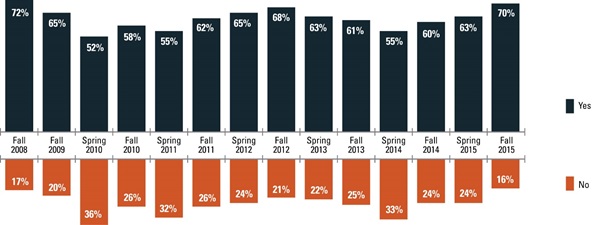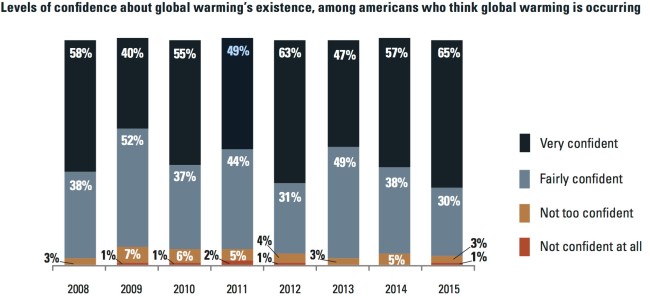Some good news has popped up, and so as reported here …
With NASA reporting that 2015 is on track to be the hottest year on record for Earth and as parts of the Western United States are gripped by extreme drought, Americans are less likely than at any time since 2008 to say there is not solid evidence of global warming. The latest results of the National Survey on Energy and the Environment (NSEE) from the University of Michigan and Muhlenberg College finds that only 16% of Americans believe that solid evidence of global warming over the last four decades does not exist. This is down from 33% just 18 months ago (Figure 1).
 Hey, now that is indeed cool (no pun intended), because a lot of people are changing their minds about it all and are starting to accept the rather obvious evidence.
Hey, now that is indeed cool (no pun intended), because a lot of people are changing their minds about it all and are starting to accept the rather obvious evidence.
As an aside, the graph above was the result from this specific question …
“From what you’ve read and heard is there solid evidence that the average temperature on earth has been getting warmer over the past four decades?”
Note that it places specific emphases by asking “is there solid evidence?“, and that is perhaps a rather good way of phrasing that question.
Where is this survey?
The full details of the National Survey on Energy and the Environment (NSEE) from the University of Michigan and Muhlenberg College, can be found here.
This latest Survey has 5 key findings
And these are …
- More Americans than at any time since 2008 indicate that there is solid evidence of increasing temperatures on Earth with 70% of residents now maintaining that view. Similarly, a record low number of Americans (16%) say that there is not evidence of global warming.
- A majority of Republicans (56%) now believe that there is solid evidence of global warming, up from 47% a year ago, joining solid majorities of Democrats (79%) and Independents (69%).
- Americans who believe there is evidence of global warming are also increasingly confident in their belief, with a record 65% saying they are “very confident” in their appraisal.
- Severe drought across many parts of the United States has become the factor most cited by Americans as having a “very large” effect on their position that global warming is occurring. A record 61% of Americans who indicate there is evidence of global warming said severe droughts were having a very large effect on their belief.
- In previous NSEE surveys, large majorities of American who do not believe there is evidence of global warming have pointed to local weather observations as the basis for their position. In the Fall 2015 survey, however, more than a third (34%) of those doubtful of global warming said local weather observation has “no effect” on their views about climate change, the highest percentage in the history of the NSEE.
So basically overall the message is getting out there – we have a problem, a really big one and it will greatly impact us all.
But we have been here before, in 2008 72% said “yes”
True indeed, back in 2008 72% accepted that climate change was backed by solid evidence, and so while there has been an uptick, we are now only at 70%, so were things better then?
Well no, but this is because as you dig into the data, you find that the degree of confidence has changed, and that marks this as a turning point that is quite real, and distinctly different, and so it is not as elusive as 2008, when the percentage of those that were confident about saying “yes” was not as large as it is this time.
One other big difference is that the political divide is fast evaporating, as highlighted on the 2nd page of the PDF of the report …
There are some significant shifts across various demographic groups on the existence of global warming, including political party affiliation where Republicans have consistently demonstrated more doubt than Democrats or Independents. In Fall 2015, however, doubt about the existence of global warming decreased more among individuals describing themselves as Republicans than among self-described Democrats or Independents. Over the last year the percentage of Republicans that stated there is not evidence of global warming decreased by 15 points from 41% to 26%. Comparatively, only 6% fewer Democrats and 4% fewer Independents stated that there was not solid evidence of global warming (see Figure 2). The relatively lower drop in levels of doubt about global warming among Democrats and Independents may be in part due to their comparatively low levels of doubt. Nonetheless, the far more substantial decline in doubt among Republicans contributed significantly to the record low levels of doubt about global warming reported in the Fall 2015 NSEE.
Now that is a truly big deal, because it means that if this trend continues then the issue ceases to be a political one, and so opposition to taking action need no longer be opposed simply because it was an initiative from “them”. It involves all of us and we all need to work together on a way forward that transcends the normal political divide.
Even today we can begin to see the impact of this because some of the Republican presidential candidates and starting to back away from outright denial, not because they have personally changed their minds, but simply because the guys behind them are whispering about the sound bytes that will and will not win hearts and minds, and so they will happily ditch the strong denial stance for that reason alone.
So what changed?
One word will sum that up – drought.
The recent and rather severe drought has persuaded people to pause and consider that it really is happening. OK, yes, there have also been severe floods and storms as well.
And to add a pinch of salt to all this …
It’s a poll, and so should be handled with a degree of caution. The new numbers are of course interesting as are the trends over the years, … but, … (this is where I advise considerable caution) … their data sample is tiny.
- They only interviewed 911 people by phone, so you need to consider that the margin of error for that number is +/- 3.5% at a 95% level of confidence.
- The wording of questions can also be a factor that can potentially lead to a biased result
… as for who funded the survey, well that can also lead to a potential conflict of interest, but in this case they are fine because it was financed using general revenues of the University of Michigan. Additionally, the authors did not accept any stipend or supplemental income for the completion of the survey itself or the associated report.
All in all, an interesting survey that points towards a more rational future and brings with it the hope that we can all, regardless of political leanings, start to focus on a solution before it is too late.
